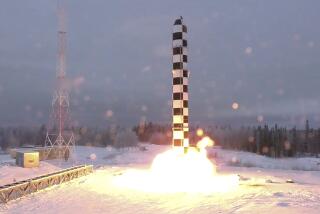Kremlin Says A-Test Hurts Arms Efforts
- Share via
MOSCOW — Soviet Foreign Minister Eduard A. Shevardnadze said in an interview published Friday that Moscow has not given up hope of an arms accord with Washington during President Reagan’s final two years in office.
But in that interview with the Czechoslovak Communist Party newspaper Rude Pravo, quoted by the official news agency Ceteka, Shevardnadze said the U.S. nuclear test on Tuesday had undermined the Kremlin’s optimism.
Meanwhile, Soviet President Andrei A. Gromyko met Friday with former U.S. Secretary of State Cyrus Vance and spoke of the “dangerous consequences” of the U.S. Strategic Defense Initiative--the “Star Wars” program.
Gromyko, who was Foreign Minister when Vance was in former President Jimmy Carter’s Cabinet, made the comments at a meeting in the Kremlin, according to the official news agency Tass.
‘Unconstructive Position’
It said Gromyko “pointed to the Reagan Administration’s unconstructive position at arms limitation and reduction talks and its striving to press on with the so-called Strategic Defense Initiative, that is to begin militarizing outer space with all ensuing dangerous consequences.”
Vance was visiting Moscow as part of a private American delegation from the Council of Foreign Relations, a New York-based group that includes many former U.S. government officials.
Shevardnadze, who returned Thursday from a two-day visit to Prague, was quoted as saying, “We would not like to believe that the present U.S. Administration has taken the final choice and that it is ready to allow the failure of the whole perspective of an agreement with the Soviet Union.”
‘Dangerous Rush’
He said that he hoped the Reagan Administration would not let its “remaining two years be wasted on the same dangerous rush for the vision of military superiority.”
“I believe that it is also in (Washington’s) interest to get to the end of the term of office of the present President with a good score,” Shevardnadze said.
Moscow said Thursday that it would end an 18-month unilateral testing freeze as a result of Tuesday’s U.S. nuclear test blast in the Nevada desert, the first this year.
The Soviets are bitterly opposed to SDI, saying it would touch off an arms race in space. The Reagan Administration has said the project is a purely defensive system designed to protect against a missile attack.
More to Read
Sign up for Essential California
The most important California stories and recommendations in your inbox every morning.
You may occasionally receive promotional content from the Los Angeles Times.










